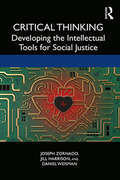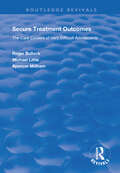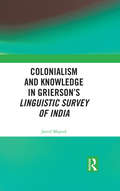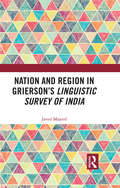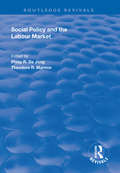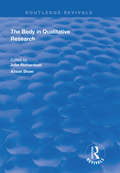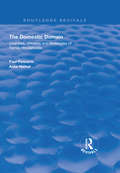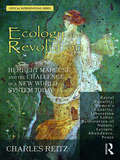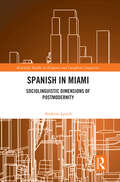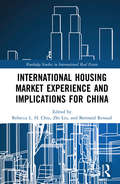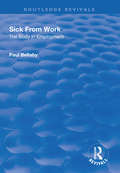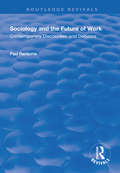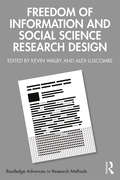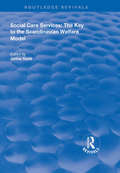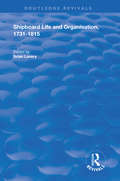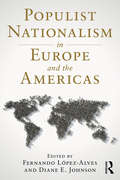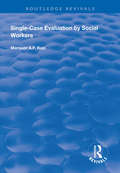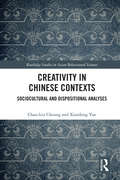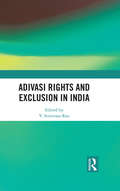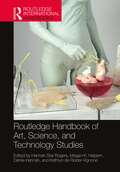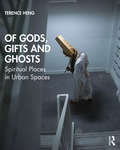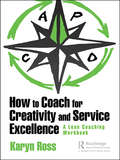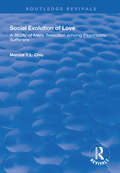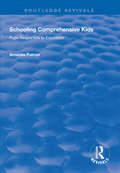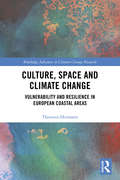- Table View
- List View
Critical Thinking: Developing the Intellectual Tools for Social Justice
by Jill Harrison Joseph Zornado Daniel WeismanCritical Thinking presents, defines and explains the intellectual skills and habits of mind that comprise critical thinking and its relationship to social justice. Each of the sequential chapters includes detailed examples and learning exercises that guide the reader step by step from intellectual competency, to critical thinking, to cultural cognition, and to critical awareness necessary for social justice. The book documents and explains the scope of multiple crises facing society today, including environmental destruction, income and wealth inequality, large-scale human migration, and the rise of autocratic governments. It shows how critical thinking, cultural cognition, and critical awareness lead to the possibility of solutions grounded in social justice. All college students, especially those in the social sciences and humanities, will develop the intellectual skills necessary for critically engaging information in order to become active learners and effective agents in the world. This book complements information in introductory, interdisciplinary, or discipline-specific courses. Every chapter contains examples and exercises that can be assigned as homework, adopted as in-class activities, or both. The Conclusion also contains exercises for developing writing and basic mathematical competency skills.
Secure Treatment Outcomes: The Care Careers of Very Difficult Adolescents (Routledge Revivals)
by Roger Bullock Michael Little Spencer MillhamFirst published in 1998, this volume recognises that, despite the plethora of benign welfare approaches to troubled and troublesome adolescents, a small proportion find themselves locked up. Who are they, why is it thought necessary to contain them and what effect does it have? This Dartington study tries to answer these questions by scrutinising the lives of 204 young people admitted to long-stay secure treatment units. It charts their experiences from their point of entry until two years after they leave. It also looks at equally difficult youngsters whose behaviour is dealt with in other ways. With such a varied group, it is difficult to be categorical about the value of security but, by employing a 'career' perspective that takes account of the interaction between life routes and process, the relationship between young people’s background characteristics, treatment and subsequent experience becomes clear. In fact, the research found considerable predictability amid the apparent chaos, a feature that should help practitioners and managers to fashion more effective approaches.
Colonialism and Knowledge in Grierson’s Linguistic Survey of India
by Javed MajeedThis book is the first detailed examination of George Abraham Grierson’s Linguistic Survey of India, one of the most complete sources on South Asian languages. It shows that the Survey was characterised by a composite and collaborative mode of producing knowledge, which undermines any clear distinctions between European orientalists and colonised Indians in British India. Its authority lay more in its stress on the provisional nature of its findings, an emphasis on the approximate nature of its results, and a strong sense of its own shortcomings and inadequacies, rather than in any expression of mastery over India’s languages. The book argues that the Survey brings to light a different kind of colonial knowledge, whose relationship to power was much more ambiguous than has hitherto been assumed for colonial projects in modern India. It also highlights the contribution of Indians to the creation of colonial knowledge about South Asia as a linguistic region. Indians were important collaborators and participants in the Survey, and they helped to create the monumental knowledge of India as a linguistic region which is embodied in the Survey. This volume, like its companion volume Nation and Region in Grierson’s Linguistic Survey of India, will be a great resource for scholars and researchers of linguistics, language and literature, history, political studies, cultural studies and South Asian studies.
Nation and Region in Grierson’s Linguistic Survey of India
by Javed MajeedGeorge Abraham Grierson’s Linguistic Survey of India is one of the most complete sources on South Asian languages. This book is the first detailed examination of the Survey. It shows how the Survey collaborated with Indian activists to consolidate the regional languages in India. By focusing on India as a linguistic region, it was at odds with the colonial state’s conceptualisation of the subcontinent, in which religious and caste differences were key to its understanding of Indian society. A number of the Survey’s narratives are detachable from its rigorous linguistic imperatives, and together with aspects of Grierson’s other texts, these contributed to the way in which Indian nationalists appropriated and reshaped languages, making them religiously charged ideological symbols of particular versions of the subcontinent. Thus, the Survey played an important role in the emergence of religious nationalism and language conflict in the subcontinent in the 20th century. This volume, like its companion volume Colonialism and Knowledge in Grierson’s Linguistic Survey of India, will be a great resource for scholars and researchers of linguistics, language and literature, history, political studies, cultural studies and South Asian studies.
Social Policy and the Labour Market: Issues At Stake Across The World (Routledge Revivals #2)
by Theodore R. Marmor Philip R. JongFirst published in 1997, this volume examines why, while mature welfare states are being trimmed and privatised, new social welfare arrangement are implemented in formerly communist and newly industrialised countries. The papers in this volume bring together these different worlds, but also different academic approaches. Micro-economic analyses of social insurance and welfare systems are joined with broader political descriptions of social policy in such disparate regions as Scandinavia, China, Italy, Poland and South Africa. They give the reader a sense of the fundamental problem of finding a social welfare system that fits specific economic and cultural conditions. This volume is the second in a series on international studies of issues in social security. The series is initiated by the Foundation for International Studies on Social Security (FISS). One of its aims is to confront different academic approaches with each other, and with public policy perspectives. Another is to give analytic reports of cross-nationally different approaches to the design and reform of welfare state programs. The present and next volume form a twin set in the sense that they both are based on selections from papers presented at seminars held by FISS in 1994-1996.
The Body in Qualitative Research (Routledge Revivals)
by John Richardson Alison ShawFirst published in 1998, the three main themes of the book are representation (images and symbols which depict the body), regulation (the social control of bodies) and resistance (strategies which challenge dominant representation and regulation). These themes run through the various chapters which span a wide spectrum of bodily topics. The chapters deal not only with major issues such as media images of male and female bodies, but also with neglected problems such as workplace bullying, unusual settings such as residential institutions for trainee clergy and 'exotica' such as naturism and fetish practices. The topics range from the healthy and sporting - bodybuilding clubs and rugby culture - through to the health problems of Crohn’s Disease sufferers and the self-harm practices of women in bail hostels. Also, the book sheds light on the ageing process by including not just young people (teenage girls in physical education lessons) but also the older and increasingly assertive generation of 'wrinklies.'
The Domestic Domain: Chances, Choices and Strategies of Family Households (Routledge Revivals)
by Anke Niehof Paul PennartzFirst published in 1999, the primary focus of this book is what goes on inside the ‘black box’ of households, beginning with decision-making but branching out to develop a comprehensive view of the domestic domain. It brings together theoretical frameworks relevant to the study of family households from several root disciplines, each framework highlighting a different approach. Each approach is applied to important problems concerning the functioning of family households. The book focuses on households and their members as active agents who manage both material and immaterial resources. The private sector, to which family households belong, is not viewed as just responding to impulses from the formal economy and to public policies, but as a dynamic system in its own right. In the view of Paul Pennartz and Anke Niehof, households not only accommodate to social change but also mediate and generate social change. In the book key studies are presented which exemplify approaches and issues. The key studies cover a wide range of societies in Europe, North and Latin America, Asia and Africa, thus also exemplifying the comparative perspective, which is another important feature of the book. Pennartz and Niehof examine issues including the organisational approach and resource allocation, the power approach and the division of household production tasks and the opportunity structure approach and the housing market.
Ecology and Revolution: Herbert Marcuse and the Challenge of a New World System Today (Critical Interventions)
by Charles ReitzA timely addition to Henry Giroux’s Critical Interventions series, Ecology and Revolution is grounded in the Frankfurt School critical theory of Herbert Marcuse. Its task is to understand the economic architecture of wealth extraction that undergirds today’s intensifying inequalities of class, race, and gender, within a revolutionary ecological frame. Relying on newly discovered texts from the Frankfurt Marcuse Archive, this book builds theory and practice for an alternate world system. Ecology and radical political economy, as critical forms of systems analysis, show that an alternative world system is essential – both possible and feasible – despite political forces against it. Our rights to a commonwealth economy, politics, and culture reside in our commonworks as we express ourselves as artisans of the common good. It is in this context, that Charles Reitz develops a GreenCommonWealth Counter-Offensive, a strategy for revolutionary ecological liberation with core features of racial equality, women’s equality, liberation of labor, restoration of nature, leisure, abundance, and peace.
Spanish in Miami: Sociolinguistic Dimensions of Postmodernity (Routledge Studies in Hispanic and Lusophone Linguistics)
by Andrew LynchSpanish in Miami reveals the multifaceted ways in which the language is ideologically rescaled and sociolinguistically reconfigured in this global city. This book approaches Miami’s sociolinguistic situation from language ideological and critical cultural perspectives, combining extensive survey data with two decades of observations, interviews, and conversations with Spanish speakers from all sectors of the city. Tracing the advent of postmodernity in sociolinguistic terms, separate chapters analyze the changing ideological representation of Spanish in mass media during the late 20th century, its paradoxical (dis)continuity in the city’s social life, the political and economic dimensions of the Miami/Havana divide, the boundaries of language through the perceptual lens of Anglicisms, and the potential of South Florida—as part of the Caribbean—to inform our understanding of the highly complex present and future of Spanish in the United States. Spanish in Miami will be of interest to advanced students and researchers of Spanish, Sociolinguistics, and Latino Studies.
International Housing Market Experience and Implications for China (Routledge Studies in International Real Estate)
by Bertrand Renaud Rebecca L. Chiu Zhi LiuRecent rapid housing market expansion in China is presenting new challenges for policy makers, planners, business people, and citizens. Now that housing in middle-income China is driven by consumer choices and is no longer dominated by state policy decisions, housing policy issues in Chinese cities are becoming increasingly similar to those encountered in other global housing markets. With soaring prices and imbalances in housing supply favoring high income groups and housing demand driven by rising inequality in household incomes, many middle and lower-income households face worsening choices in terms of the quality and location of their housing as well as greater financial difficulties, which together can have negative implications for standards of public health. This book examines the impact of these changes on the general population, as well as on aspiring homeowners and developers. The contributors look at the effect on the widening of wealth gaps, slower economic growth, and threats to political and social stability. Though focusing on China, the editors also present discussions of specific policy design challenges encountered in Australia, Japan, Korea, the Netherlands, the Nordic countries, Singapore, Taiwan, the UK, and the US. This book would be of interest to housing policy makers, as well as academics who are studying the social and political effects of the Chinese housing market.
Sick From Work: The Body in Employment (Routledge Revivals)
by Paul BellabyFirst published in 1999, this aims to shift the balance from current concerns about individual behaviour and its health effects to an understanding of the social factors that shape both circumstances and behaviour conducive to health. Its focus is the fact that organized work in paid employment is the common experience of most adults before their sixties, and that individuals have widely varied employment security, working conditions and job control that are likely to affect health (for good and ill) beyond working age itself. It brings together usually disparate work in the sociologies of health and illness and the body; and the sociologies of work and organizations. Importantly, the book is research-based. The argument is supported with primary data that the author has collected in varied workplaces in Britain - a pottery manufacturer, a food-processing firm and the NHS among them and analysis of official statistics and large data sets, as well as secondary literature which is international in scope. The audience includes first and higher degree students in sociology, health and environmental sciences and management studies.
Sociology and the Future of Work: Contemporary Discourses and Debates (Routledge Revivals)
by Paul RansomeFirst published in 1999, this book adopts an explicitly forward-looking and dynamic approach in trying to understand not only where the sociology of work has come from but of where it is likely to go next. For the first time in a single volume, it reviews the continuing usefulness of the 'classical' accounts of Karl Marx, Max Webster and Emile Durkheim, the post-industrial accounts of the 1960s and 1970s and the post-Fordist accounts of the 1980s and 1990s. It provides specific treatment of key topics such as technological change and 'flexibility', the impact of gender on work, the changing nature of the relationship between work and personal identity and the possible emergence of economic globalization, all of which are currently receiving much academic and popular attention. The treatments of gender, identity and globalization are challenging and innovative in that they go beyond simply describing current debates, and question the validity of some of the premises on which they are based. For example, that it is not possible to provide a 'unifying' explanation of gender inequality at work because its causes are multiple rather than singular; that it is wrong to imply that work will cease to be an important basis of personal identity; and that evidence of economic globalization is far too patchy to justify the claim that we are living in a 'global economy.' The text combines theoretical analysis with clear descriptions of the key arguments and tests these against current empirical data.
Freedom of Information and Social Science Research Design (Routledge Advances in Research Methods)
by Kevin Walby Alex LuscombeThis multidisciplinary volume demonstrates how Freedom of Information (FOI) law and processes can contribute to social science research design across sociology, criminology, political science, anthropology, journalism and education. Comparing the use of FOI in research design across the United Kingdom, the United States, Australia, Canada and South Africa, it provides readers with resources to carry out FOI requests and considers the influence such requests can have on debates within multiple disciplines. In addition to exploring how scholars can use FOI disclosures in conjunction with interview data, archival data and other datasets, this collection explains how researchers can systematically analyse FOI disclosures. Considering the challenges and dilemmas in using FOI processes in research, it examines the reasons why many scholars continue to rely on more easily accessible data, when much of the real work of governance, the more clandestine but consequential decisions and policy moves made by government officials, can only be accessed using FOI requests.
Social Care Services: The Key to the Scandinavian Welfare Model (Routledge Revivals)
by Jorma SipiläFirst published in 1997, this volume aimed to study social care services as a specific type of social policy that operates on a different set of principles as supportive services rather than as poor relief or social security work. The focus is on determining what is specifically Scandinavian about the world-famous Scandinavian welfare state, with studies on issues including the origins of four social care service models, the development of local authority social services in Iceland and social services as a gender issue.
Shipboard Life and Organisation, 1731-1815 (Routledge Revivals)
by Brian LaveryFirst published in 1998, this volume explores the Royal Navy which had most of its greatest triumphs in the decades up to 1815, but has received relatively little study of its social life and shipboard administration, beyond popular myth and sensational accounts. This volume starts with the formal structure of naval discipline, with Admiralty instructions and captains' orderbooks. It then looks at how things really happened, using diaries, medical journals, petitions, court martial reports and even the menu book of a semi-literate steward. It reveals many strong characters and colourful incidents of shipboard life, while providing material for study.
Populist Nationalism in Europe and the Americas
by Fernando López-Alves Diane E. JohnsonPopulist nationalism fuses beliefs that citizens are being exploited by a privileged elite with claims that the national culture and interests are under threat from enemies within or without. Ideologically fluid, populist nationalists decry “out-of-touch” institutions such as political parties and the mainstream press while extolling the virtues of the “people.” They claim that only populists can truly represent the nation and solve its problems, and often call for unorthodox solutions that appeal to the common people. The recent spread of populist nationalism throughout the world has triggered a growing interest in the subject, led mainly by journalists. The Brexit vote and the election of Donald Trump in the US have provoked a flurry of media coverage in Europe and the Americas, along with parliamentary debates. Some social scientists have sought to explain the resurgence of nationalism and the spread of populism in recent decades, but important questions remain and most of the scholarship has not adequately addressed the fusion of nationalism and populism. It fails to examine the combination of populism and nationalism comparatively, especially the contrast between the more progressive and leftist versions such as those in Latin America, and the more traditional conservative varieties that are gaining strength in Germany, the United Kingdom, and the United States. This interdisciplinary collection by experts on Europe and the Americas fills this void. The volume examines various experiences with populist nationalism, and offers theoretical tools to assess its future. Some chapters are in-depth country case studies and others take a broader perspective, but all open the door for meaningful comparison.
Single-Case Evaluation by Social Workers (Routledge Revivals)
by Mansoor A.F. KaziFirst published in 1998, this is the first definitive text on single-case evaluation in Britain. This is a method of evaluation research which enables progress to be determined by comparing different phases in the life of a single client, group or system. It can also determine the extent to which the social worker’s intervention was responsible for the changes in the client’s target problem. Examples are provided from British experience.
Creativity in Chinese Contexts: Sociocultural and Dispositional Analyses (Routledge Studies in Asian Behavioural Sciences)
by Xiaodong Yue Chau-kiu CheungExamining creativity in Chinese societies from both a personal and contextual standpoint, this ground-breaking book offers readers a unique insight into the Chinese mind. It provides a review of the nature, origins, and consequences of creativity, deriving from empirical evidence in the Chinese context. Specifically, the book unravels the conceptualization of creativity and its relationships with various demographic and dispositional factors in Chinese societies. The book proceeds to give readers an understanding of how creativity maintains reciprocal relationships with various forms of well-being. The content of the book brings together empirical evidence and theory grounded on Chinese societies to offer researchers and students a unique realistic view of the nature of creativity there. This book will be a must read for any researcher or practitioner interested in this fascinating topic.
Adivasi Rights and Exclusion in India
by V. Srinivasa RaoThis volume examines the processes and impacts of exclusion on the Adivasis (tribal or indigenous people) in India and what repercussions these have for their constitutional rights. The chapters explore a wide range of issues connected to the idea of exclusion — land and forest resources, habitats and livelihoods, health and disease management, gender relations, language and schooling, water resources, poverty, governance, markets and technology, and development challenges — through case studies from different parts of the country. The book argues that any laws intended to safeguard the fundamental rights of Adivasis must acknowledge the fact that their diverse and complex identities are not homogenous, and that uniform laws have failed to address their systemic marginalisation since the colonial era. This work appeals for a serious and meaningful political intervention towards tribal development. The volume will be useful to scholars and researchers of tribal and Third World studies, sociology and social anthropology, exclusion studies and development studies.
Routledge Handbook of Art, Science, and Technology Studies
by Hannah Star RogersArt and science work is experiencing a dramatic rise coincident with burgeoning Science and Technology Studies (STS) interest in this area. Science has played the role of muse for the arts, inspiring imaginative reconfigurations of scientific themes and exploring their cultural resonance. Conversely, the arts are often deployed in the service of science communication, illustration, and popularization. STS scholars have sought to resist the instrumentalization of the arts by the sciences, emphasizing studies of theories and practices across disciplines and the distinctive and complementary contributions of each. The manifestation of this commonality of creative and epistemic practices is the emergence of Art, Science, and Technology Studies (ASTS) as the interdisciplinary exploration of art–science.This handbook defines the modes, practices, crucial literature, and research interests of this emerging field. It explores the questions, methodologies, and theoretical implications of scholarship and practice that arise at the intersection of art and STS. Further, ASTS demonstrates how the arts are intervening in STS. Drawing on methods and concepts derived from STS and allied fields including visual studies, performance studies, design studies, science communication, and aesthetics and the knowledge of practicing artists and curators, ASTS is predicated on the capacity to see both art and science as constructions of human knowledge- making. Accordingly, it posits a new analytical vernacular, enabling new ways of seeing, understanding, and thinking critically about the world.This handbook provides scholars and practitioners already familiar with the themes and tensions of art–science with a means of connecting across disciplines. It proposes organizing principles for thinking about art–science across the sciences, social sciences, humanities, and arts. Encounters with art and science become meaningful in relation to practices and materials manifest as perceptual habits, background knowledge, and cultural norms. As the chapters in this handbook demonstrate, a variety of STS tools can be brought to bear on art–science so that systematic research can be conducted on this unique set of knowledge-making practices.
Of Gods, Gifts and Ghosts: Spiritual Places in Urban Spaces
by Terence HengHow do individuals inscribe their spiritual identities and diasporic ethnicities in the city? Through a series of sociological and photographic essays, Terence Heng maps the various rituals, collectives, individuals and events that characterise Chinese religion practices in Singapore. From spirit mediums to the Hungry Ghost Festival, each chapter engages with the social, the spatial and the ephemeral, and in so doing it will explore the significance and relevance of Chinese religion in a secular nation-state; reveal the strategies and tactics used by diasporic individuals to perform and retain their identities; uncover the importance of flow and fluidity in the making of sacred space; and evidence the value and efficacy of the use of photographs in social research. Of Gods, Gifts and Ghosts is a ground-breaking exploration into the intersections between visual sociology, cultural geography and creative photographic practice. A visual monograph that gives equal importance to image and text, it interrogates the tensions between sacred and profane, official and unofficial, state and individual, physical and spiritual, peeling away the myriad layers of the spiritual imagination.
How to Coach for Creativity and Service Excellence: A Lean Coaching Workbook
by Karyn RossHow to Coach for Creativity and Service Excellence: A Lean Coaching Workbook is a self-contained workbook, in which the reader completes twenty-one days of practical exercises and activities focused on creativity, lean and coaching (one set per day). This will enable the reader to develop their capability and confidence to be creative, adapt lean principles, practices and tools to their unique service organization and coach others to do the same. The workbook guides the reader through a structured, systematic, easy-to-understand, habit-building approach, and function as the reader’s ‘coach’. As the reader ‘works’ their way through the book, they will reclaim their creativity, learn Karyn’s tried-and-true 15-minute a day coaching approach and adapt lean principles, practices and tools to their particular service organization. As an internationally acclaimed lean consultant, highly experienced coach and coauthor of The Toyota Way to Service Excellence, Karyn Ross is often asked to help service organizations that are struggling to translate lean principles into the sustainable practices that will meet their - and their customers' - unique needs, now and for the long-term. Over the years, Karyn has found that the best way for organizations to overcome this struggle is to develop a network of coaches who can help people at all levels: • Learn by ‘doing’. Changing what we do – and seeing the different result - changes how we think, not the opposite! • Adapt lean in a way that makes sense for their service organization. Lean practitioners working in service organizations may have difficulty adapting lean manufacturing practices to meet the special ‘people’ considerations found in services. • Practice continuously to make a habit. Coaching helps people develop the discipline and stamina needed to turn new behaviors into habits. That’s the beauty of this book! It functions as the reader’s personal ‘coach’, guiding them through the daily practice required to make new behaviors (and the resulting new thinking) a habit, so that they can coach their organization to success!
Social Evolution of Love: A Study of Mate Selection Among Psychiatric Sufferers (Routledge Revivals)
by Marcus Y.L. ChiuFirst published in 1999, this volume explores whether people with psychiatric problems would have spouses with similar psychiatric problems started with a series of concordance studies. Marcus Y.L. Chiu begins with a four-chapter literature review examining mental illness among spouses of psychiatric patients, psychological and sociological perspectives, genetics and evolution and key ethical issues. Chiu’s study then proceeds to shed some light on a personality dimensions, marital satisfaction and how one can better adapt to the environment by creating a social milieu through marriage that is accepting, understanding, and less demanding.
Schooling Comprehensive Kids: Pupil Responses to Education (Routledge Revivals)
by Amanda PalmerFirst published in 1998, this volume is based upon an ethnographic study of white and black in a mixed comprehensive school conducted during the 1980s and explores differentiation in the classroom, looking at gender, colour and class differences within groups of students. The findings are discussed in the light of the strong debate within the sociology of education that took place during the 1970s and 1980s concerning academic achievement and underachievement. Amanda Palmer reveals, in contribution to this debate, that class origins played a primary role in the formation of pupils’ attitudes towards school and that class, race and gender were involved in how teachers reacted to pupils
Culture, Space and Climate Change: Vulnerability and Resilience in European Coastal Areas (Routledge Advances in Climate Change Research)
by Thorsten HeimannWays of handling climate change vary worldwide. Differences can be observed in the perception of potential threats and opportunities as well as in the appraisal of adequate coping strategies. Collective efforts often fail not because of technical restrictions, but as a result of social and cultural differences between the actors involved. Consequently, there is a need to explore in greater depth those zones of cultural friction which emerge when actors deal with climate change. This book examines how cultural differences in the handling of climate change can be described and explained. The work develops the concept of culture as relational space, elaborates explanatory approaches, and investigates them by surveying more than 800 actors responsible for spatial development of the European coastal regions in the Netherlands, Germany, Denmark, and Poland. In doing so, this book engages with debates on cultural globalisation, in which the attachment of culture to place is increasingly being questioned. Adopting the approach of culture as relational space allows possible cultural formations to be examined across diverse fields of application from the local to the global scale. In addition, the book investigates how far different value orientations, beliefs, and identities can explain diverse perceptions of problems and opportunities right up to preferences for climate-mitigation and adaptation measures. Providing comprehensive insights into the diverse zones of cultural friction which scholars and practitioners face when handling climate change locally and globally, this book will be of great interest to those studying climate change, environmental sociology, and sustainable planning.
